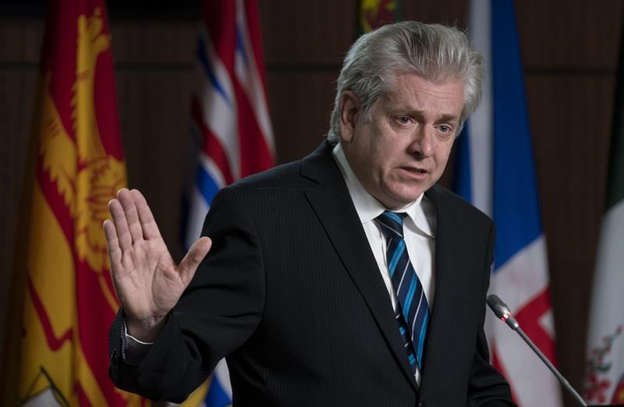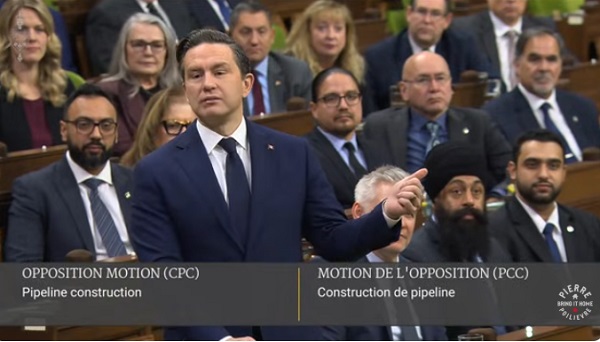Energy
Proposed legislation seeks to suppress speech about climate change and fossil fuels

NDP MP Charlie Angus
From the Fraser Institute
Canada is a constitutional parliamentary democracy where differences of opinion are to be resolved through elections, which people are persuaded by words and ideas, not threats of violence. Stripping people of the right to express themselves freely will introduce violence into the democratic process, disenfranchising some people and disenchanting others.
It’s rare, in today’s political world, for someone in power to whip off the velvet glove and show the iron fist beneath. It’s a bit gauche for our times. But that’s what happened recently when federal NDP natural resources critic Charlie Angus tabled a member’s bill that would clap anyone who says negative things about the government’s fossil-fuel-phobia into the pokey—and rob them on the way to jail. We’re not talking about a slap on the wrist, but about million-dollar fines and years in jail for simply expressing a positive thought about fossil fuels. So much for the fundamental freedom of expression in Canada.
Angus’ Bill C-372 would fine and jail people for the most innocuous of speech relating to climate change or fossil fuels. Even daring to speak the obvious truths such as “natural gas is less polluting than coal” could land you in jail for one year and cost you $750,000. If you produce fossil fuels and are found guilty of “false promotion,” you’d face two years in jail and a $1.5 million fine.
Enacting such speech restrictions would be destructive of the fabric of Canadian society, and even though this member’s bill (like most) will go nowhere, it should trouble Canadians that we’ve reached a level of political discourse where members of Parliament feel they can blatantly propose stripping Canadians of their freedom of expression, obviously convinced they’ll not pay a price it.
Specifically, Bill-372 and its pernicious idea of speech control would cause harm to two major elements of Canadian civilization—our democracy, which depends on the free exchange of ideas as Canada elects its leaders, and our mixed-market economic system where actors in the market require a free flow of information to make informed decisions that can produce positive economic outcomes and economic growth.
Let’s start with that democracy thing. Canada is a constitutional parliamentary democracy where differences of opinion are to be resolved through elections, which people are persuaded by words and ideas, not threats of violence. Stripping people of the right to express themselves freely will introduce violence into the democratic process, disenfranchising some people and disenchanting others. Canada already has to work hard to promote engagement by the public in the political process. Things like Bill C-372 would not make this easier. A less politically engaged public cedes ever more power to entrenched politicians and political activists, and leaves power in the hands of smaller minorities with extreme enough views who think opposing ideas must be suppressed with force.
Regarding free speech, consider this. Without a robust mixed-market economy, the voluntary exchange which leads to economic activity does not happen. Productivity declines and scarcity, the eternal scourge of humanity, resurges and people suffer. Freedom of expression is central to the operation of market economies. People must be free to share information about the value of things (or lack thereof) for decisions to be made, for prices to manifest, and for markets to function effectively. Without open communication in markets, diversity of goods and services will diminish as some goods and services won’t be promoted or defended while others are freely to advertised.
Bill C-372 should and likely will die an ignominious death in Parliament, but all politicians of all parties should denounce it for what it is—an attempt by government to suppress speech. Unlikely to happen, but one can always hope for sanity to prevail.
Author:
Business
Looks like the Liberals don’t support their own Pipeline MOU

From Pierre Poilievre
Alberta
They never wanted a pipeline! – Deputy Conservative Leader Melissa Lantsman

From Melissa Lantsman
Turns out the anti-development wing of the Liberal Party never stopped running the show.
Today, we’ll see if the Liberals vote for the pipeline they just finished bragging about.
Spoiler: they won’t. Because with the Liberals, the announcements are real, but the results never are.
-

 National18 hours ago
National18 hours agoLiberal bill “targets Christians” by removing religious exemption in hate-speech law
-

 Business2 days ago
Business2 days agoThe EU Insists Its X Fine Isn’t About Censorship. Here’s Why It Is.
-

 Business1 day ago
Business1 day agoCanada invests $34 million in Chinese drones now considered to be ‘high security risks’
-

 Bruce Dowbiggin2 days ago
Bruce Dowbiggin2 days agoWayne Gretzky’s Terrible, Awful Week.. And Soccer/ Football.
-

 Business15 hours ago
Business15 hours agoLooks like the Liberals don’t support their own Pipeline MOU
-

 Economy1 day ago
Economy1 day agoAffordable housing out of reach everywhere in Canada
-

 Health2 days ago
Health2 days agoCDC Vaccine Panel Votes to End Universal Hep B Vaccine for Newborns
-

 Business1 day ago
Business1 day agoThe Climate-Risk Industrial Complex and the Manufactured Insurance Crisis





